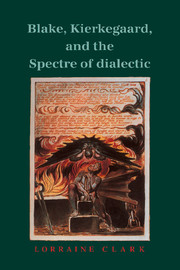Book contents
- Frontmatter
- Contents
- Acknowledgements
- A note on texts and abbreviations
- Introduction
- 1 The Spectre and the logic of error
- 2 The Spectre as Kierkegaard's concept of dread
- 3 The Spectre and the line of life
- 4 Mastered irony as the ground of human community
- 5 Irony and authority
- Conclusion. Los and the Spectre: master and slave in the labor of the negative
- Notes
- Bibliography
- Index
4 - Mastered irony as the ground of human community
Published online by Cambridge University Press: 19 January 2010
- Frontmatter
- Contents
- Acknowledgements
- A note on texts and abbreviations
- Introduction
- 1 The Spectre and the logic of error
- 2 The Spectre as Kierkegaard's concept of dread
- 3 The Spectre and the line of life
- 4 Mastered irony as the ground of human community
- 5 Irony and authority
- Conclusion. Los and the Spectre: master and slave in the labor of the negative
- Notes
- Bibliography
- Index
Summary
Altho' our Human Power can sustain the severe contentions Of Friendship, our Sexual cannot: but flies into the Ulro
Blake, MiltonBy reason of the infiltration of the State and social groups and the congregation and society, God can no longer get a hold on the individual. …So let us rather sin, sin out and out, seduce maidens, murder men, commit highway robbery – after all, that can be repented of, and such a criminal God can still get a hold on.
Johannes Climacus, Concluding Unscientific PostscriptThe tension between the extremes of reason and will, the two forms of unmastered irony which can for Blake and Kierkegaard equally negate life, in the realm of human community takes the form of an extreme tension between “the public” and “the private.” Indeed, this tension between public and private is for many the central difficulty or problem with Blake's and Kierkegaard's ideal of life, for their radical individualism threatens to undermine any public realm – political, social, or ethical – whatsoever, and may in fact underlie the profoundly vexed question of their politics (that is, the question of what politics their radical individualism entails). This individualism is why despite their resistance to the perspectivisms of radical Nietzschean irony Blake and Kierkegaard belong finally more within the tradition of Nietzschean philosopher-poets concerned with the project of self-creation than within any tradition of sociopolitical philosophers of community or human “solidarity.”
- Type
- Chapter
- Information
- Blake, Kierkegaard, and the Spectre of Dialectic , pp. 109 - 146Publisher: Cambridge University PressPrint publication year: 1991



